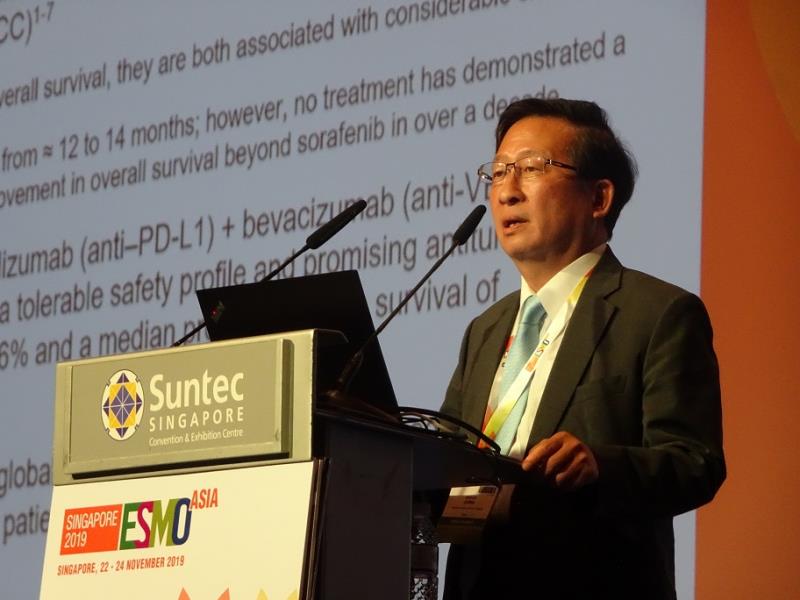 Dr Ann-Lii Cheng from the National Taiwan University Cancer Center in Taipei, Taiwan
Dr Ann-Lii Cheng from the National Taiwan University Cancer Center in Taipei, TaiwanThe combination of the PD-L1* inhibitor atezolizumab and the VEGF** inhibitor bevacizumab gains the upper hand over sorafenib in the treatment of unresectable hepatocellular carcinoma (HCC), according to the results of the phase III IMbrave150*** trial presented at ESMO Asia 2019.
“[IMbrave150] is the first study in 11 years to show improvement in survival with a new first-line treatment option vs sorafenib … [Our findings suggest that] atezolizumab plus bevacizumab has the potential to be a practice-changing treatment option in HCC,” said study author Dr Ann-Lii Cheng from the National Taiwan University Cancer Center in Taipei, Taiwan.
The study involved 501 individuals (median age 65 years, 83 percent male) with unresectable HCC who have not had prior systemic therapy. Participants were randomized 2:1 to receive combination therapy comprising intravenous (IV) atezolizumab 1,200 mg Q3W + IV bevacizumab 15 mg/kg Q3W or standard-of-care (SoC) sorafenib 400 mg twice daily. Participants continued to receive their designated treatments until unacceptable toxicity or loss of clinical benefit has been observed. [ESMO Asia 2019, abstract LBA3]
After a median follow-up of 8.6 months, compared with sorafenib, combination therapy led to a clinically meaningful improvement in the coprimary endpoints of overall survival (OS; median, not estimable vs 13.2 months; hazard ratio [HR], 0.58, 95 percent confidence interval [CI], 0.42–0.79; p=0.0006) and progression free survival (PFS; median, 6.8 vs 4.3 months; HR, 0.59, 95 percent CI, 0.47–0.76; p<0.0001), as well as in overall response rate (27 percent vs 12 percent; p<0.0001).
The incidence of adverse events (AEs) was similar between combination therapy and sorafenib (57 percent vs 55 percent [grade 3/4] and 5 percent vs 6 percent [grade 5]), which was in line with the known safety profiles of each individual component and the underlying disease, noted Cheng. Deterioration in quality of life was also delayed with combination therapy vs sorafenib (median time to deterioration, 11.2 vs 3.6 months; HR, 0.63, 95 percent CI, 0.46–0.85).
Encouraging results
Over the past 11 years, no treatment has demonstrated a superior OS advantage over sorafenib which, according to Cheng, “has been very frustrating because sorafenib has a response rate of around 10 percent and is associated with severe side effects.”
The current findings highlight the clinical potential of the atezolizumab-bevacizumab combination as a new systemic therapy in this setting, said discussant Dr Ian Chau from the Royal Marsden Hospital in London, UK. “This is the first time a novel treatment has shown a survival benefit compared with the current SoC … The results are very encouraging.”
Not pocket friendly
However, the high cost of immunotherapy and anti-angiogenic agents barricades access to sustainable care, underscored Chau, suggesting a few instances by which access to these agents may be improved (eg, resorting to biosimilars, dose reduction). Future investigation should therefore evaluate factors influencing cost to address drug accessibility and treatment sustainability. “[It is] very important that these drugs are accessible to patients,” said Chau.
“[Overall,] there is a strong possibility this drug combination will be approved by regulatory authorities and incorporated into international guidelines … I think this is a very important study that will really shape first-line treatment for advanced HCC,” said Chau. Further trials should incorporate biomarker analyses and should have longer follow-ups to confirm the magnitude of the OS benefit given the relatively short median follow-up time, he added.